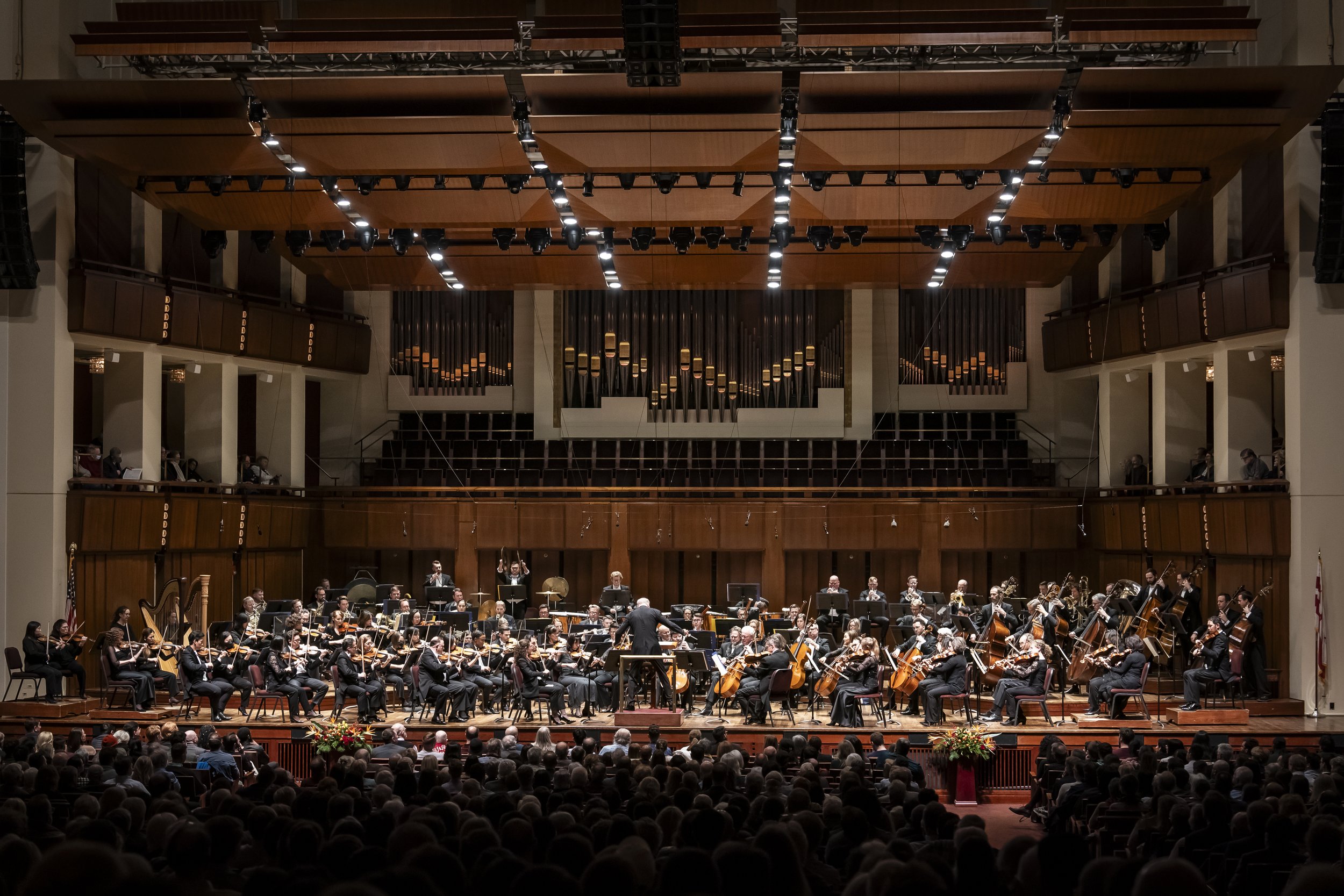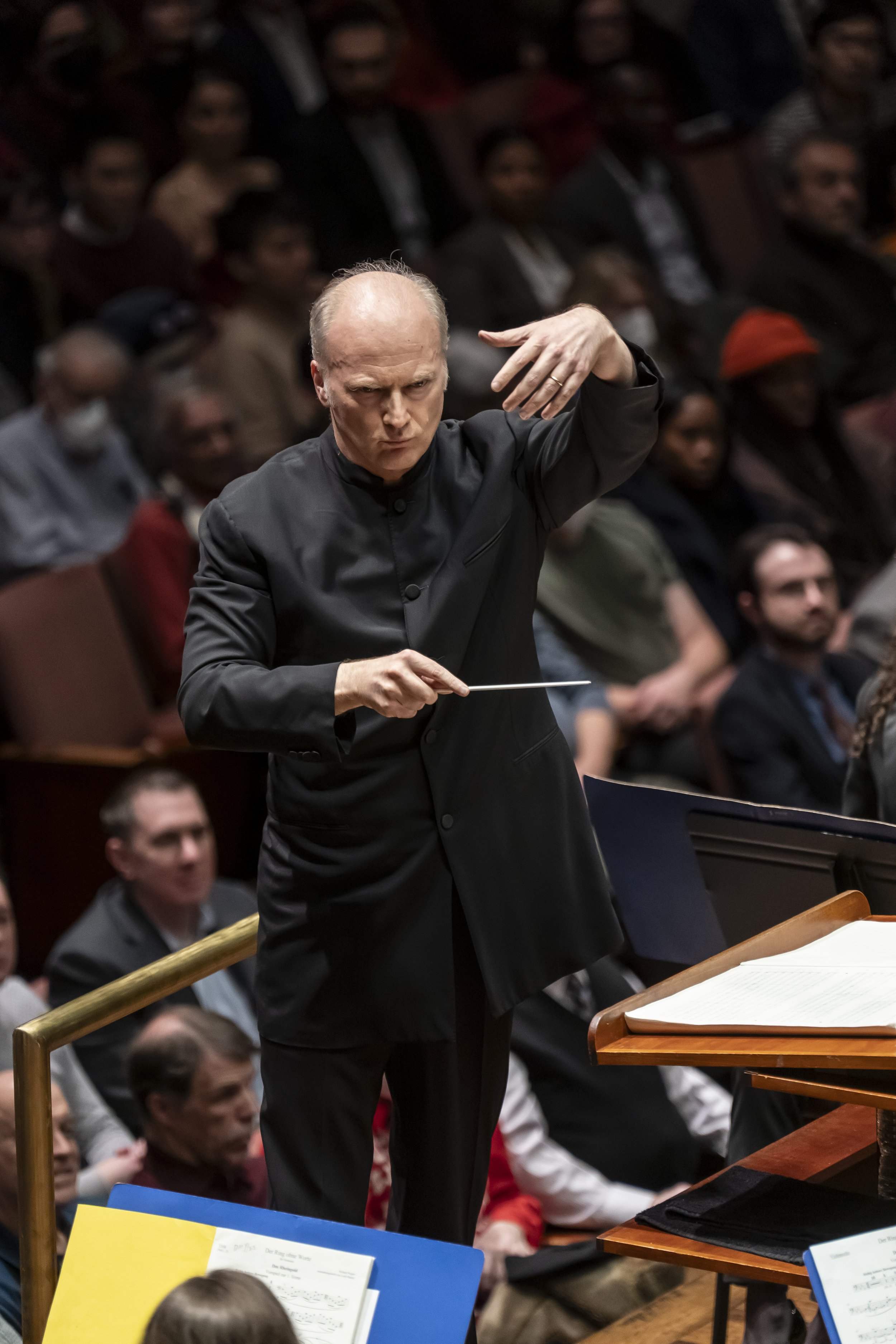The enthusiastic and elongated standing ovation at the conclusion of the National Symphony Orchestra’s playing, under the direction of Maestro Gianandrea Noseda, “Ring without Words” offered compelling evidence that I was in a minority of one. Further, I could find no solace in reviews of this work when performed by other orchestras. Well, I tried to enjoy it, honest, I did.
The National Symphony Orchestra led by Conductor Gianandrea Noseda. Photo by Scott Suchman; courtesy of the National Symphony Orchestra.
For me, Wagnerian opera was an acquired taste, but once acquired it became a passion, though with a bitter taste. Wagner was both a great composer and, from all reports, a seriously flawed human being. His forte was composing operas, not symphonic works; he has eleven operas that are still performed today. He completed only one symphony, which was not well received. His desire was to create what he called musical dramas as “gesamtkunstwerk”, a theater package that included all art forms as a maxed out dramatic experience, with music being an active participant in the dramas. He popularized the concept of using leitmotifs or short musical themes to identify with people, places, objects, or ideas. His music in many of his operas has been redrafted with success for presentation as orchestral works. Given that my first love is opera and that the NSO performances are always a treat, I could not pass this one up, especially given the chance to hear Wagner’s music performed by an orchestra the size and quality of the National Symphony Orchestra. My expectations were high.
This history behind this performance bears mentioning. In 1987, the recording company Telarc persuaded the late, great conductor Lorin Maazel to make a condensed orchestral version of music from Richard Wagner’s the Ring Cycle (Der Ring des Nibelungen or The Ring of the Nibelung), a work consisting of four separate operas –
Das Rheingold (or The Rhinegold),
Die Walküre or (Valkyrie),
Siegfried,
Das Götterdämmerung or (Twilight of the Gods) –
a grouping which lasts over 16 hours in total. The plot-line from Norse mythology that runs through all four opera concerns a golden ring that gives the possessor god like power over everyone… but with the condition that they give up love; overall, the Ring is an engrossing and compelling drama about the destructive influence of power when not guided by love. Telarc had a confining stipulation for Maazel: the work had to come in under 75 minutes to fit on a single compact disc. Maestro Maazel’s effort that he labeled the “Ring without Words” stitched together musical highlights from the four operas, presented in the same order as the operas; his program came in around 70 minutes. The “Ring without Words”, which began as a studio recording, has enjoyed popularity as a concert piece, still performed occasionally today. This distillation offers music fans the chance to sample Wagner’s music without committing to 16 hours required to hear the operas. It so happens that NSO’s Music Director and Conductor Gianandrea Noseda has recently conducted the entire Ring Cycle and will do so again in May 2024 for the Zurich Opera House, where he holds the position of General Music Director. Now, it also happens that there was another concert scheduled for NSO’s season in the January 11, 12, and 13 slot, but the solo performer to appear canceled this past November. This confluence of need and competence enabled NSO to quickly fill the void with a quality and timely replacement. I don’t know how season ticket holders took the news, but the KC Concert Hall was mostly packed on Thursday evening.
Conductor and NSO Music Director Gianandrea Noseda. Photo by Scott Suchman; courtesy of the National Symphony Orchestra.
Let me be clear: my issues were with the program, not the performance thereof; this is great music by a great composer, assembled by a great conductor, and it was played with verve and beauty by a great orchestra led by a great conductor. All the elements were in place for a fine performance. In the beginning, the music of the Rhine entered slowly and swirled, engulfing the audience; the orchestra pushed the ride of the Valkyries out over the audience. Further along a clanking sound of a hammer fashioning a sword drifted out. Siegfried and Brunnhilde began their love affair. Finally, Brunnhilde makes a sacrifice to cleanse and offer hope once more. That was happening in my mind’s eye which was conjuring images from the operas. Certainly, it was beautiful music, sometimes in a slow encompassing pace, moving slowly and now and then surging with raging crescendos, sometimes with a wall of shimmering sound (I love Wagner’s use of horns). Individual sections of the orchestra took turns with the lead and even a lovely cello solo was offered.
So, what’s your problem, dude? Well, I looked forward to the opportunity to focus on hearing this music sans the singing and story, but I could not. One of my favorite moments in opera is the beginning of Das Rheingold when the swirling music of the Rhine rises as in a wave and the Rhine maidens break into song - it’s thrilling, but they weren’t there that night and the water simply moved on empty and alone. I tried to adjust, but more and more the moments of beauty seemed lonely and disjointed. I can only wonder what someone unfamiliar with the Ring Cycle heard. Were they enticed to attend the entire Ring Cycle, or will they think that its music that had its moments but is not worth 16 hours and the expense required? Based on what I heard that evening, I would be delighted to attend Noseda’s performances of the complete cycle with the Zurich Opera in May, or better yet, how about doing it again in the Kennedy Center. Francesca Zambello’s 2016 Ring was outstanding; it’s time for another round!
Perhaps for me the experience was like having one potato chip when there are four varieties on the table, but it goes deeper, maybe like hearing four movements from Mozart symphonies without pause, where each movement came from a different Mozart symphony. Music elicits feelings or at least it shades feelings, but in a personal way, speaking to us in a language we can only understand subconsciously. Great composers like Mozart could compose ensemble arias where different individuals singing at the same time to the same tune were expressing very different feelings. The great opera composers became adept at using music to assign meaning to stretches of music that works for their dramas, and when we hear it in the opera, the meaning given to us becomes imprinted on our consciousness. That music becomes associated in our minds with those characters or places or ideas. I cannot hear the theme from the TV show “Have Gun, Will Travel” without seeing in my mind’s eye Paladin dressed in black, or hear Lara’s Theme without seeing fields of wind caressed flowers in Russia or hear “Do you hear the People Sing” from “Les Misérables” without sensing the patriotic pride of liberty, equality, and fraternity. Think of what you experience when you hear the musical theme from the movie, “Jaws”. Wagner refined that ability to create short snippets of music that became associated with characters or places or ideas that helped him tell his stories. Classical music also has an underlying order, even though it is something I cannot articulate. That order is why I most often feel calmed by classical music. However, in opera the meaning of the music has been assigned. Perhaps when I heard Maazel’s suite of opera music from the Ring Cycle played as an orchestral piece, those meanings, the music and the opera-assigned ones, clashed at transition points, and it felt chaotic, even though musically the transitions were relatively smooth. Perhaps, seventy minutes of these changes was too much for me to enjoy at one time. Or perhaps, like Scrooge I can hope that the ghost visiting me that night was just an undigested piece of potato (in my case peanut butter crackers).
Finally, the performance by the National Symphony Orchestra led by Conductor Noseda was as strong as I anticipated, no problem there, but for whatever reason, the Ring without Words program did not work for me that night. For me, Maestro Maazel’s Ring suite of seventy minutes, at best, only made me long for the sweet sixteen hours of Wagner’s. Maybe for the Ring Cycle, I need the gesamtkunstwerk; I hope Ms. Zambello is listening.
The Fan Experience: Performances of “Ring without Words” were scheduled for January 11, 12, and 13 in the Concert Hall at the Kennedy Center. The work is intended to be performed continuously without interruption, though in Thursday’s performance, enthusiastic fans could not resist interrupting the performance a couple of times with applause.
Parking in the Kennedy Center is typically plentiful at around $25 per day, with a small discount for Kennedy Center members when reserved ahead of the day. The Metro to Foggy Bottom and the free red Kennedy Center buses, from there to the Kennedy Center running every 15 minutes, are an excellent option. There is an advantage in getting there a bit early. KC frequently has multiple performances on its different stages overlapping that can create traffic jams, even unexpected ones inside the Center. Thursday, the middle section of the Grand Foyer in front of the Opera House was squadroned off and only attendees for “Frozen” could enter that area, and they had to pass through metal detectors to enter.
There are snack stands in the main lobby, and on the Terrace level, the KC Café offers food cafeteria style at moderate prices; fine dining is available on the Terrace level in the Roof Terrace Restaurant. Food and drinks except water are not allowed inside the opera house, but you can purchase reusable containers with your drinks that you can take inside.


